Learn the difference between hemp seed oil, hemp oil, and CBD oil—plus how to spot marketing scams and how to tell what’s really in that bottle!
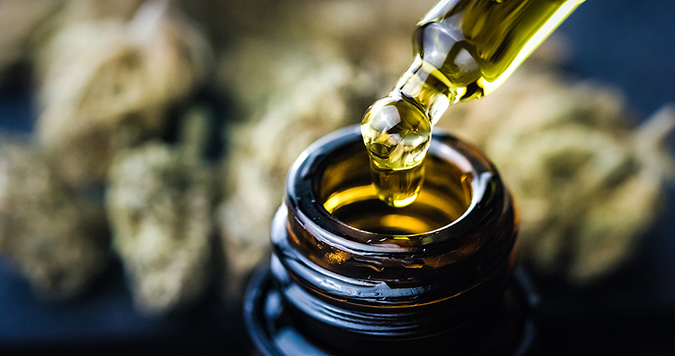
CBD Oil, Hemp Seed Oil, and Hemp Oil: What’s the Difference?
Lately, I’ve noticed that some online retailers who used to selling products called “CBD oil” have changed their product names to “hemp oil.” Their products are still priced in the well-over-$100 range that is typical for CBD (cannabidiol). Their websites still use terms like “full-spectrum” or “broad-spectrum” to promote the efficacy and safety of their products. Yet, those three magic letters “CBD” were removed from the products.
I have a hunch why they did this that I’ll share with you at the end of this post. But that trend prompted me to take a close look at the use of the terms “hemp oil” and “CBD oil” and what they really mean for consumers.
Hemp Seed Oil
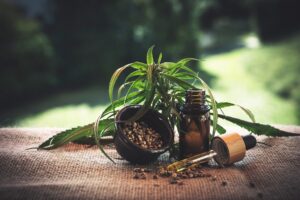
Let’s start with a look at “hemp seed oil,” which is sometimes referred to as “hemp oil.” Hemp seed oil is exactly what it sounds like. Oil is pressed from hemp seeds and bottled for sale much like sesame or peanut oil.
CBD and THC-Free
Hemp seeds contain no CBD. However, sometimes small quantities of CBD can be found in hemp seed oil due to cross-contamination from contact with leaves during the pressing process.[1]https://cdn-ext.agnet.tamu.edu/wp-content/uploads/2019/09/Hemp-Benchmark-Data-September-2019.pdf Generally, though, the amounts of CBD are so minute that we assume hemp seed oil-based products contain no CBD.
Hemp seed oil also has no THC (the stuff in marijuana that makes you feel high). So, if you are worried about accidentally testing positive for illegal levels of THC, food-grade hemp seed oil is a safe choice.
Omega 3-6-9 Rich
Despite being CBD- and THC-free, hemp seed oil has other potential benefits. Specifically, it contains omega-3, omega-6, and omega-9 fatty acids, γ-linolenic acid, and other nutritious antioxidants.
By popular demand, we are now offering our full-spectrum CBD oil (along with our terpene-loaded CBD oil) as part of our monthly Group Buy. This is a chance to get your high-quality CBD oil of choice … at a 27% discount + free shipping!
The health benefits of those compounds may reduce the risk of heart disease, treat skin disorders, help with PMS and menopause, aid in digestion, promote brain health, and more.[2]https://www.medicalnewstoday.com/articles/324450#takeaway-and-future-research[3]https://www.healthline.com/nutrition/6-health-benefits-of-hemp-seeds
As wonderful as hemp seed oil is … it simply does not have the same medicinal utility as CBD oil.
I wish I could give you a straight-up comparison of the differences between CBD oil and hemp seed oil. Unfortunately, due to FDA legal regulations, sellers of CBD oil are strictly prohibited by law from making claims about the potential medical uses of CBD. Since TGN sells CBD products, I’ll have to let you do that research on your own.
Visit the National Institutes of Health (NIH) website for information on CBD health benefits.
Hemp Seed Oil is Totally Legal
Another fundamental difference between hemp seed oil and CBD oil is that hemp seed oil is completely legal everywhere in the US. It’s a food product just like olive oil.
You May Also Enjoy:
“5 Reasons Why CBD Is Such a Big Deal”
“A History of Kratom: Medicine, Murder, and Political Intrigue”
You can find hemp seed oil at your local grocery store in the health food section or with the cooking oils. It’s an ingredient in all sorts of beauty products sold by big box stores, across state lines, and on Amazon (which does not allow the sale of CBD products).
Meanwhile, some US states still prohibit the sale of CBD oil even when sellers follow the FDA guidelines related to CBD marketing.
Dietary Supplement vs. Pharmaceutical Drug
Hemp seed oil can also be legally marketed as a dietary supplement. So you may find it in with the vitamins, too. Hemp seed oil packaging and advertising may include claims about health benefits, as long as they indicate those claims have not been evaluated by the FDA.
Hemp oils that contain concentrated CBD, by contrast, can’t be marketed as a dietary supplement because the FDA considers CBD to be a pharmaceutical drug.
You May Also Enjoy:
“Pharmaceuticals vs. Herbal Medicine: 3 Vital Differences”
“10 Medicinal Uses for Comfrey: Wound Healer, Muscle Relaxer, Ulcer Treatment, Eyewash, and More”
Drugs, unlike dietary supplements, must go through an expensive application and human trial process to be legally marketed for their health benefits.
Here’s an infographic about that process: https://www.fda.gov/media/82381/download.
Nearly all of the CBD products sold today are not approved drugs according to the FDA. However, the FDA is allowing certain CBD products to be sold under the conditions that retailers don’t claim that CBD treats any medical conditions (e.g., insomnia, anxiety, pain, etc.).
Price Differential
One final difference between CBD oil and hemp seed oil is that CBD is much more expensive to grow and process.[4]https://cdn-ext.agnet.tamu.edu/wp-content/uploads/2019/09/Hemp-Benchmark-Data-September-2019.pdf For example:
- Hemp plants grown for hemp seed oil are grown from seeds that cost about $11 per pound for roughly 27,000 seeds.[5]https://www.quora.com/How-many-seeds-are-in-a-pound-of-hemp-seed
- Hemp plants used for CBD are grown from seeds that cost around $2,450 per pound or about $0.09 per seed.
- Feminized CBD seeds, which produce female plants with even higher levels of CBD, cost over $1 per seed.
Plus, CBD plants grown for their large flower heads require more space per plant. Male plants are usually culled to prevent cross-pollination with more valuable female plants. And harvesting and processing for CBD is more time-consuming.[6]https://fas.org/sgp/crs/misc/R44742.pdf
Hemp Seed Oil vs. CBD Oil
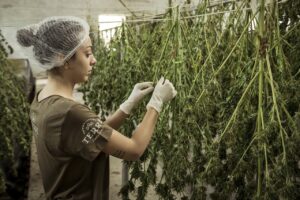
From a manufacturer’s perspective, hemp seed oil is a completely different product than CBD oil. Yet, in retail, these terms are sometimes used interchangeably. Sadly, sometimes this is done to trick uninformed buyers into paying pressed-flower prices for seed oil.
As an example, it costs $10 for a 12-ounce container of Certified Organic cold-press hemp seed oil at the market. Meanwhile, online retailers (found on Amazon) are selling 1-ounce dropper bottles of “hemp oil” for more than $20. According to their ingredient list, those products contain only hemp seed oil and minor additives such as lavender oil or artificial flavor. That’s a pretty steep markup, in my opinion.
Fortunately, it’s easy to identify hemp seed oil masquerading as CBD oil. Just read the ingredients listing. Hemp seeds and their oil must be listed as a separate ingredient on the label by law.
High-CBD and Low-CBD Hemp Oil
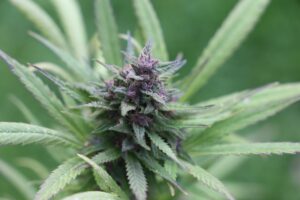
Now that you can distinguish hemp seed oil from CBD oil, let’s talk about hemp grown for CBD oil. When you extract oils from any hemp plant, you’ll get lots of various phytocannabinoids and terpenes. But if you want hemp oil with high levels of naturally occurring CBD, you have to take extra steps.
CBD-rich hemp plants are grown using those super expensive CBD seeds or feminized CBD seeds mentioned earlier. Those plants are also spaced and grown specifically to increase flower-head size. Finally, cross-pollination has to be limited.
You May Also Enjoy:
“Case Study: Head Wound Healing of Tissue Defects Using Herbs”
“How to Choose CBD: Full-Spectrum, Broad-Spectrum, or Isolates”
Cross-pollination reduces the potency of the phytocannabinoids, including CBD. So, male plants are culled early and only female plants are harvested. Also, fields are situated to prevent accidental cross-pollination from wild hemp or industrial hemp grown for seeds.
When those best practices are applied, the flower heads will contains lots of CBD, a legal dose of THC, and a plethora of other phytocannabinoids and terpenes.
Low-CBD Hemp Oil
Sometimes, though, things go wrong. Perhaps the seed strain was tainted. Maybe growing conditions weren’t ideal or male plants weren’t culled in a timely fashion. Those events can dramatically reduce the CBD content in the plant oils. Or, sometimes growers just harvest before peak CBD. As a result, that hemp oil won’t have enough CBD to be sold as a concentrated CBD-oil product without modification.
On the upside, low CBD in hemp also equals low-to-no THC in the hemp oil.
In CBD hemp seed strains, the THC production in a plant is directly related to CBD content. So, if CBD goes up, THC goes up. If CBD goes down, THC goes down.
In some cases, you may even get 0% THC. So, this kind of hemp oil tends to fall easily below the legal limits for THC.
Uses for Low-CBD Hemp Oil
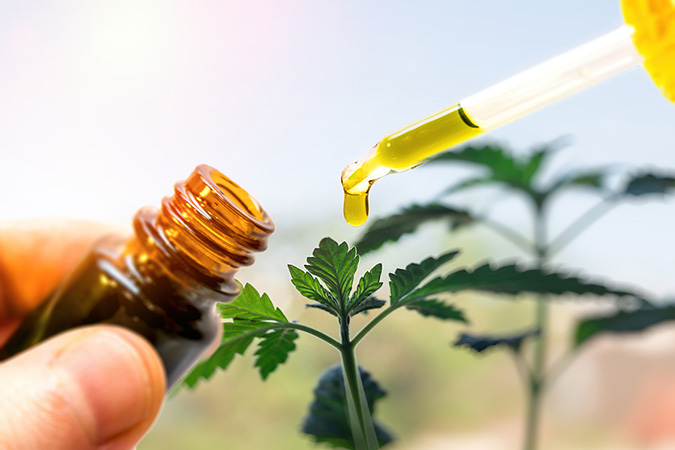
Low-CBD-content hemp oil doesn’t have the same market value as CBD-rich hemp oil. But it still has a lot of uses.
CBD Oil Carrier Agent
Sometimes low-CBD hemp oil is used as a carrier agent for CBD isolates (nearly pure CBD). The result is often marketed as a THC-free, full-spectrum CBD oil. The hemp oil is naturally THC free because those plants were low in CBD and THC. But it’s also full-spectrum because the flower heads were pressed for hemp oil and the THC was not stripped out.
You May Also Enjoy:
“10 Incredibly Powerful Antiviral Herbs”
Broad-spectrum products, by contrast, start with THC, but it’s removed before bottling. The THC-removal process also strips out some, though not all, of the other beneficial phytocannabinoids.
CBD Oil Knockoffs
Sadly, sometimes low-CBD-content hemp oils are marketed as CBD oil even without the addition of CBD isolates. Because they do have some CBD in them, they technically count as CBD oil. But, the quantities of CBD may be too small to have meaningful health impacts.
Thankfully, you can easily spot those knockoff products. They won’t list the exact milligrams of CBD in each dose on the label.
Beauty Products
CBD-lite hemp oil is also frequently added to beauty products such as massage oils, lotions, face creams, toothpaste, and more.
Even without the CBD, hemp oil may be useful when applied topically. However, there are risks to mixing and matching products with unknown quantities of CBD. You could have your body on a CBD roller coaster and not even realize it.
CBD Oil Disguised as Hemp Oil
Besides CBD-rich and low-CBD variations of hemp oil, there’s one last situation that might confuse consumers.
Remember back at the start of this article, when I mentioned how some product labels suddenly changed from CBD to hemp oil?
You May Also Enjoy:
“15 Natural Antibiotic Alternatives”
“9 Benefits of Kratom: A Natural Alternative to Opioids and Mood Enhancers”
Well, in 2019, the FDA sent out “Warning” letters to some CBD sellers telling them to change their marketing approach or stop selling CBD products. In response, some retailers realized they could potentially avoid FDA pressure by calling CBD oil products hemp oil instead.
Hemp is legal to be grown with a state-issued license. It’s also legal to transport in interstate commerce. CBD, meanwhile, is shrouded in legal ambiguity and confusion. So, if you can get out of legal hot water just by calling your CBD products hemp oil instead, wouldn’t you?
Read Carefully!
Only time will tell if the FDA actually turns a blind eye to hemp oil products that contain significant amounts of CBD. In the meantime, read your labels carefully and look for Certificates of Analysis that clearly state your product’s CBD content.
You May Also Enjoy: “3 Hidden Dangers of Buying CBD and 3 Simple Ways to Protect Yourself”
What Do You Think?
Have you used hemp seed oil, hemp oil with low levels of CBD, or CBD oil? What do you think of all these products? How do you make sure the hemp oil you get has the key ingredients you need? If you have experience to help others navigate the CBD world, we’d love to hear from you!
______________
This is an updated version of an article that was originally published on May 20, 2020.
Psst! Our Lawyer Wants You to Read This Big, Bad Medical Disclaimer –> The contents of this article, made available via The Grow Network (TGN), are for informational purposes only and do not constitute medical advice; the content is not intended to be a substitute for professional medical advice, diagnosis, or treatment. Always seek the advice of a qualified health care provider with any questions you may have regarding a medical condition. If you think you may be suffering from any medical condition, you should seek immediate medical attention. You should never delay seeking medical advice, disregard medical advice, or discontinue medical treatment because of information provided by TGN. Reliance on any information provided by this article is solely at your own risk. And, of course, never eat a wild plant without first checking with a local expert.
The Grow Network is a participant in the Amazon Services LLC Associates Program, an affiliate program designed to provide a means for our team to earn fees for recommending our favorite products! We may earn a small commission, at no additional cost to you, should you purchase an item after clicking one of our links. Thanks for supporting TGN!

The Grow Network is a global network of people who produce their own food and medicine. We’re the coolest bunch of backyard researchers on Earth! We’re constantly sharing, discovering, and working together to test new paths for sustainable living—while reconnecting with the “old ways” that are slipping away in our modern world. We value soil, water, sunlight, simplicity, sustainability, usefulness, and freedom. We strive to produce, prepare, and preserve our own food and medicine, and we hope you do, too!
References
| ↑1, ↑4 | https://cdn-ext.agnet.tamu.edu/wp-content/uploads/2019/09/Hemp-Benchmark-Data-September-2019.pdf |
|---|---|
| ↑2 | https://www.medicalnewstoday.com/articles/324450#takeaway-and-future-research |
| ↑3 | https://www.healthline.com/nutrition/6-health-benefits-of-hemp-seeds |
| ↑5 | https://www.quora.com/How-many-seeds-are-in-a-pound-of-hemp-seed |
| ↑6 | https://fas.org/sgp/crs/misc/R44742.pdf |
